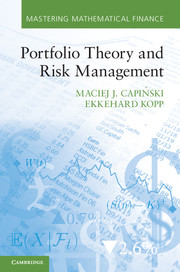6 - Utility functions
Published online by Cambridge University Press: 05 May 2015
Summary
Making the fundamental assumption that rational investors prefer more wealth to less, we impose preference relations on the set of possible final (time 1) positions of an investor who, at time 0, invests a fixed sum in a range of risky securities. In this chapter we simplify the analysis by restricting to a finite sample space, so that there are N possible outcomes. We state axioms for preference relations among the N-dimensional vectors representing the possible outcomes for his final wealth. Each such relation is expressed in terms of a real-valued function called a utility.
We focus on utilities arising as expectations, and show that utility maximisation is closely related to the No Arbitrage Principle (NAP), which is discussed in detail in [DMFM]. This leads to the introduction of state prices (equivalently, risk-neutral probabilities). We solve the utility maximisation problem in terms of minimising expectations with respect to the set of possible state price vectors. We also explore the relationship between quadratic utility functions and the CAPM and conclude with a brief study of risk aversion measures.
Basic notions and axioms
We begin with recalling some basic probability notation.
- Type
- Chapter
- Information
- Portfolio Theory and Risk Management , pp. 76 - 97Publisher: Cambridge University PressPrint publication year: 2014



